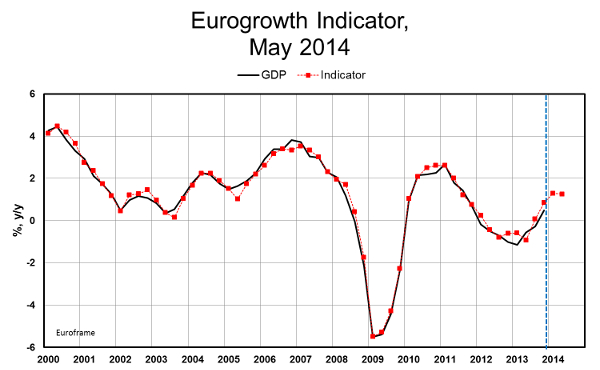The Eurogrowth Indicator, calculated by the Euroframe group in the beginning of May, points to a moderation of the Euro Area GDP growth in the first half of 2014. The forecast quarter-to-quarter growth rates are 0.6 and 0.3 per cent. Having risen by 0.1 percentage points in April, the second quarter estimate returned to the level forecast in March 2014.
The second quarter QOQ estimate was drawn down mainly by a drop in the contribution of industrial survey. The positive contribution of industrial confidence diminished quite strongly. On the other hand the contribution of household confidence, which has had a long-lasting strongly negative impact on the Indicator, with a recent peak in the first quarter of 2013, is forecast to continue its improvement. The strengthening of the euro vis-à-vis the USD since the fall 2013 has weakened the Indicator only slightly.
The positive QOQ growth rates of the Euro Area GDP since the second quarter of 2013 translate into high year-on-year rates for the first half of 2014. The forecast annual growth rates rise to 1.3 per cent for both quarters, compared to 0.5 per cent in the last quarter of 2014.
All in all, the weak recovery since the second quarter in 2013 seems not to be gaining momentum in quarter-to-quarter comparison. On the contrary, the substantial weakening of industrial managers’ confidence undermines the growth.
One obvious explanation for managers’ deteriorating mood is the escalation of Ukrainian crisis in early 2014. The US and the EU countered the annexation of the Crimean peninsula to Russia in March 18 by imposing sanctions against Russia. So far sanctions have not been very harmful either for the US or for the EU, but they and increasing uncertainty are already taking their toll on the Russian development and Russian-linked business. However, the main issue for the Euro Area industrialists is the possibility that the crisis could develop into a trade war, which could strongly damage all parties’ economic development.
